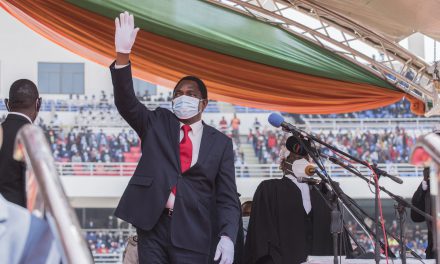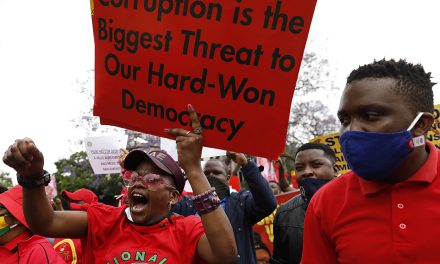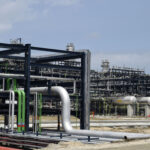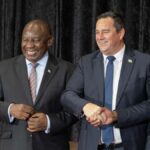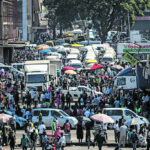Whoever wins the presidential race in Nigeria’s imminent elections has his work cut out. For the incoming president, the outlook across board is decidedly much worse than in 2015 when Muhammadu Buhari first won the presidency.
Much more inspired reform will be needed beyond what is currently acknowledged in the feel-good manifestos of all the leading presidential contestants. That includes intelligent sequencing of policy interventions that address both the symptoms and the root causes of Nigeria’s multifold crisis.
Most of the country’s current woes, such as poor economic performance, deep-seated poverty and widespread insecurity are symptoms of fundamental problems that due to misguided policymaking have remained unresolved for far too long. Will the 2023 cohort of contestants produce a dogged reformer of the type Africa’s largest democracy sorely needs?
Macroeconomic decline
When Buhari became president in 2015, Nigeria’s economy was in a markedly better shape than at present with annual GDP growth averaging 5.6% during the 2011-2014 period. During Buhari’s first and second terms, the economy only grew at an average 0.9% and 1.8% per year respectively. Economic expansion has been far too slow for incomes to rise or make any meaningful dent in poverty reduction. In fact, population growth has consistently outpaced economic expansion.
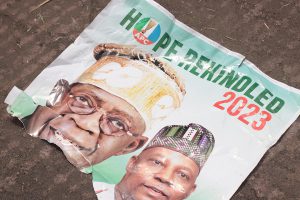
An electioneering poster reflecting the faces of All Progressives Congress (APC) leader, Bola Tinubu (L) and running mate Kashim Shettima (R), lies on the ground party during their final rally at the Teslim Balogun Stadium in Lagos on February 21, 2023, ahead of the Nigerian presidential election scheduled for February 25, 2023. Photo by Samuel Alabi/AFP
GDP per capita (at purchasing power parity) had been falling even before the Covid-19 pandemic hit and is now about 12% lower than in 2015. In 2019, Buhari promised to lift 100 million people out of poverty over the next decade; an entirely unrealistic target at the time that today remains unmet despite the government’s claims that it delivered.
In fact, based on the US$1.90 poverty threshold and according to World Bank estimates, about 41% of Nigeria’s population was living in extreme poverty in 2015. That equates to roughly 75 million of Nigeria’s citizens. By 2019, this number had climbed to over 87 million or 43% of the population. In 2022, an estimated 100 million Nigerians were living in extreme poverty; a rate of 44.7%. The National Bureau of Statistics (NBS) even put the figure at 133 million based on its Multidimensional Poverty Index which takes into account sanitation, access to healthcare, food insecurity, and housing, amongst other things.
Policy missteps
External factors, in particular the pandemic, need to be acknowledged, but they must not detract from the numerous policy failures that successive Nigerian administrations recorded. If one were to apply the US$3.20 poverty threshold as suggested by the World Bank for lower-middle income economies like Nigeria, the picture would look even more dismal with 77% of the population or 172 million Nigerians living below the poverty line in 2022.
In short, poverty has been worsening in Nigeria, and on the current demographic and economic trajectory the number of poor people will only increase in the future. According to the International Futures system, an integrated modelling platform housed at the Frederick Pardee Centre for International Futures at the University of Denver in 20 years from now, close to 112 million people could live on less than US$1.90 and 233 million below US$3.20.
Tough going
Clearly, for the country’s incoming president reducing poverty will be an uphill battle. First, the new administration needs to significantly improve macroeconomic stability as well as the investment climate for both national as well as foreign direct investment. Just as important, the government must continue to narrow the infrastructure gap, boost local oil refining capacity, and invest in agriculture. Recurrent expenditures such as salaries together with the oil subsidy, and the corruption around the latter especially, have contributed to Nigeria’s currently ballooning debt, with the fiscal receipt for the first time being eclipsed this year by the national debt servicing spend.
Infrastructure arguably is about the only area where the current administration can point to tangible progress – with the delivery of key national projects such as four new international airport terminals, rail revamp and national highway constructions. Yet, there are many other indicators pointing to a deterioration of Nigeria’s macroeconomic performance since Buhari first assumed the presidency.
Debt, for example, accounted for only about 16% of GDP at the time Buhari was sworn in as president in 2015 versus 37% of GDP at present. This number is three times as high. Similarly, the budget deficit has almost tripled, jumping from -1.6% of GDP in 2015 to -4.7% in 2022. In other words, despite falling revenues driven by the significant drop in oil production, the government kept spending. Moreover, annual average inflation at just over 9% in 2015 was at close to 19% in 2022, mostly due to dramatic increases in food prices.
According to the NBS, at least half of Nigerians are under- or unemployed, and the situation is much worse for young people. For Nigeria to have a better chance at poverty reduction, the economy needs to grow much faster and very importantly, more rapidly than the population. Pivoting onto a more sustainable demographic trajectory is also imperative to improve the ratio between people of working age and dependents, mostly children. That will put Nigeria in a position to reap a demographic dividend.
This requires more family planning initiatives, increased access to contraceptives and improved education for girls. The next administration must prioritise investing in human capital by improving education and training as well as access to basic infrastructure, such as safe water and improved sanitation. Only a healthy and skilled workforce can be truly productive and transformative. Also, more inclusive growth and tackling inequality must become a priority.
Tackling insecurity
Nigeria’s security crisis is another pending task that the incoming president needs to tackle with urgency. Security has deteriorated severely under Buhari, and the fact that the lines between politically motivated and criminal violence have become ever more blurred is complicating matters further.
In 2022, the Armed Conflict Location Event Data (ACLED), an organisation that systematically tracks violence, recorded a total of almost 125,000 violent events across different categories, up from about 45,000 events in 2016. That is close to a threefold increase. The rise in violence targeting civilians by state forces has been especially steep, followed by the upsurge in explosions and violence, such as bombings and improvised explosive device attacks.
Moreover, kidnappings, banditry and abductions of school children have been on the rise. Between 2020 and 2021 alone, ACLED recorded a doubling of incidents. The 2020 Afrobarometer survey also registered high levels of fear among Nigerians with more than 85% of respondents reporting being concerned about kidnappings and attempted kidnappings in their state.
Much of the uptick in violence and crime can be traced to Nigeria’s harsh economic deterioration in a context of a generalised lack of opportunities, especially for young people that make up the lion’s share of the population. Once crime and violence become endemic, human development takes an even greater toll.
The road ahead
Turning that vicious cycle becomes harder unless competent leaders deliberately push to improve both security governance and socioeconomic conditions. This is what Nigeria’s next president needs to do. On the upside, all the leading candidates have unveiled manifestos that place varying degrees of emphasis on private sector-led solutions to unblock major economic roadblocks. This is salutary.
Whoever wins though needs to go further in spelling out the tough trade-offs and difficult choices facing the country, including the pivotal shifts impending in an economy that will need finally to rein in a long subsisting and wasteful oil subsidy scheme that totalled more than $6 billion in 2022.
Without this wholesale and hard-headed economic realism, Nigeria will remain hamstrung from making the critical human investments it needs to secure its future. Reprioritizing spending away from waste towards more productive investments, whilst liable to being politically costly and unpopular, is the only way to grow the pie and defuse the time bomb of rising hopelessness among the critical mass of Nigerians, especially the youth cohort. There are no quick fixes, but Nigeria can and must do infinitely better.
You can find the PDF version of this article here.
Dr Julia Bello-Schünemann is a multilingual research consultant. She is versed in integrated forecasting across sectors (including demographics, infrastructure, economics, conflict and violence, etc.), trend and risk analysis, data analysis, policy advice for governments and international organisations. Her expertise straddles Africa, Latin America, the Caribbean, and the European Union. She possesses vast experience in project management, fundraising, strategic planning, multi-stakeholder consultations, training and facilitation. She is currently an Associate Senior Research Consultant with Good Governance Africa-Nigeria. She holds a PhD in International Relations from the Complutense University Madrid, Spain and an MA in Communication, Political Science and Economics from Ludwig-Maximilians-University, Munich in Germany.



